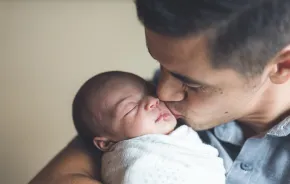 Teaching your preschooler basic courtesy and good manners sometimes can feel like an uphill struggle, but don't despair. The keys to success are relatively simple, but they do require persistence, patience and consistency.
Teaching your preschooler basic courtesy and good manners sometimes can feel like an uphill struggle, but don't despair. The keys to success are relatively simple, but they do require persistence, patience and consistency.
"Expectation is key," says Sal Severe, Ph.D., a local psychologist, nationally known parent educator and best-selling author of How to Behave So Your Preschooler Will, Too! "Expect the same good manners of your preschooler that you would expect from any child, but remember that you won't always get good manners."
First, your preschooler needs to know specifically what it means to behave politely and use good manners. Explain, for example, that we say "please" and use our "nice voice" to ask for something or that we don't jump on the sofa at Grandma's house.
"The skills a child needs to be courteous are patience, self-control and knowledge of the rules of courtesy," says Elizabeth Crary, Seattle-based parent educator and author of many books including the classic Without Spanking or Spoiling: A Practical Approach to Toddler and Preschool Guidance.
"Before I take my daughters somewhere, like a play date or birthday party, we'll go over our rules and sometimes do a bit of role-playing to discuss appropriate responses to certain situations," says Tracy Eckert of Everett, mother of girls ages 5 and 3.
Among the most important actions you can take to encourage good manners is using the polite behaviors you want to see in your preschooler, experts agree. "Courtesy needs to be part of how you operate, not something you add on," Crary says.
Explain why good manners and being polite are important. For example, Severe says, you might tell your preschooler: "When you behave politely, people feel good and they like being with you."
Point out others behaving politely. You might say, "That man who bagged our groceries sure was courteous," and then explain what was polite about how he behaved and what he said.
In addition, recognize the times your child exhibits good manners, and reinforce that behavior with praise:
"You waited patiently while I was on the phone. Thank you."
"You remembered to say 'thank you.' I'm certain that made Mrs. Smith feel good."
"You greeted that person like a grown-up."
Maintaining your patience and avoiding power struggles are important, Severe and Crary emphasize. "At this age, children are exploring power and identity issues. If saying 'please' and 'thank you' becomes too important to the parent, the child may withhold courtesy to show they have control," Crary says.
Reading your preschoolers stories with manners and feelings themes is an effective way to teach good manners, Severe says. While they are enjoying the story, they see specific examples and solutions. You also get the opportunity to discuss various aspects of good manners in a low-key way, before the issues arise.
Hartley Steiner, a Bothell mother of three boys, says that her older sons, ages 4 and 2, respond to the Disney Channel's "Good Manners with Max" segment, which they watch and discuss together. "My kids remember the show and later use what they've seen," she says.
Severe and Crary emphasize that consistency is critical to successfully teaching manners (or any desirable behavior). Otherwise, "you'll be starting over," Severe says.
When you get discouraged, it may help to remember that setbacks are part of the ongoing process of teaching discipline and polite manners. And according to Severe, your efforts will pay off. "All those little things contribute to who they are and how they get along with others," he says.
It's the little successes keep Tracy Eckert going. "For example, even though my 5-year-old daughter doesn't always share well with her younger sister, I've seen her use her socials skills in public and at school, so I know our efforts do work," Eckert says.
Julie Kumasaka is a technical editor and occasional freelance writer. She and her husband have a (usually) good-mannered daughter, age 5.
Websites for raising polite preschoolers:
Elizabeth Crary's STAR Parenting website includes an interactive tool you can apply to help correct various behaviors.
Rude Busters: Children's etiquette resources from parenting experts.
Books for parents:
Dealing with Disappointment: Helping Kids Cope When Things Don't Go Their Way by Elizabeth Crary
Teaching Your Children Good Manners: a Go Parents! Guide by Lauri Berkenkamp and Steven C. Atkins
Love and Limits: Guidance Tools for Creative Parenting by Elizabeth Crary (practical tips for encouraging any kind of desirable behavior)
Books for preschoolers:
A Little Book of Manners: Courtesy and Kindness for Young Ladies by Emilie Barnes
A Little Book of Manners for Boys by Bob and Emilie Barnes
Oops! Excuse Me, Please! And Other Mannerly Tales by Bob McGrath
Perfect Pigs by Marc Brown and Stephen Krensky









